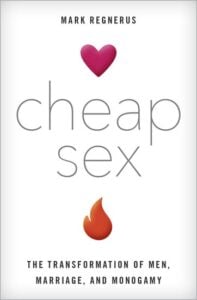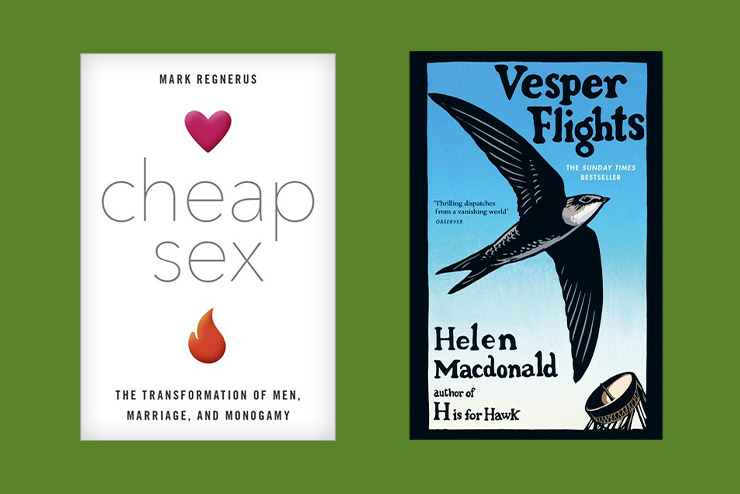It is undeniable that sex is cheap in America. Historically, women were sexual gatekeepers and controlled its value. Sex was expensive, and a man had to offer much in exchange for a woman’s favors. A stable job and the ability to be a faithful partner and caring parent were the minimum requirements. A man demonstrated those qualities first by respecting the woman in whom he was interested, which meant going at her pace.
The sexual revolution of the 1960s destroyed the traditional dating structure that protected women from predatory men seeking only sex. The revolution “liberated” sex from the patriarchal institution of marriage, but the ultimate consequence has been a mating culture that gives men what they want for less and harms women.

The argument of Mark Regnerus’s 2017 book, Cheap Sex, is summarized by two of his interview subjects. Sarah has no trouble finding dates, but she is in her early 30s and wondering when she will marry. Her ideal vision is to meet the right guy and go slow to ensure emotional commitment comes first. But in every relationship she has, even with marriageable men, sex happens quickly. They push things along, and she feels compelled to acquiesce. She knows that men have options and are unlikely to wait long. She dislikes this reality, but she doesn’t know what can be done about it.
Carlos represents a common male type in this new culture, which Regnerus calls the Genital Life. Carlos is addicted to porn, especially videos he makes of the many women with whom he has had sex. His current girlfriend is troubled by this hobby. His response: “I don’t give a shit.” In the traditional dating culture, Carlos would have been left where he deserves to be: alone. But there are many women who put up with this behavior, which ensures its growth.
The university at which I work recently celebrated “Sex Positivity Week.” The student newspaper opined about how much work remains to be done in combating the ubiquitous, repressive idea that “sex is taboo.” Anyone with two eyes knows what a laughable proposition that is. Sex Positivity Week is consistent with the Genital Life. It claims any effort to change its dehumanizing meat market by returning sacredness to sex is contrary to the interests of young people, especially women. Cheap Sex exposes that colossal lie for what it is.
The Genital Life destroys committed relationships. A counterrevolution is the only thing that can save us from a future of Sarah and Carlos, multiplied endlessly.
—Alexander Riley
Soaring into the literary firmament, Helen Macdonald’s 2014 H is for Hawk, her searing account of a grief-charged relationship with a goshawk, was the best book about a bird since T. H. White’s 1951 The Goshawk.

Macdonald’s Vesper Flights (2020) is a collection of articles on varied themes and is similarly characterized by accipitrine alertness, imaginative sympathies, and numinous suggestiveness. Readers will empathize with her uncomplicated (albeit informed) relishing in life of all forms— from chasmoliths in fumaroles to swifts, the screaming spirits of upper air—and agree with her about our reckless ravaging of the Earth. She aspires to be simultaneously earthed and universal—picking mushrooms, seeking veteran American Chestnuts, mercy-killing mortally injured ostriches, watching eclipses, envisioning microbes on Mars. She ascends the Empire State Building to stare even more dizzyingly up, at the aerial forms that winged this way before humans were—and hopefully will always—although over 100,000 birds die each year in NYC alone, disoriented by lights, crashing into commerce’s cliffs, and tumbling to tragedy.
Science aids understanding, but only literature helps explain why it matters that a secretive little bird like the wood warbler is vanishing from English woodland. The smallest such loss is not just a shrinkage for the bird itself (and coexisting species), but also for ourselves, as our once-a-thrum environment daily grows more dead. Something shrivels within when we no longer hear birds we used to hear, or see a meadow turned into a sterile plain by mindless mowing. The fields of our youth are always being built on, and as they go under, we too are coated with concrete.
Macdonald devotes much thought to the connections between national and natural histories. Animals are often proxies for humans, and vice versa. Even scientists studying species anthropomorphize individual animals, and sometimes animals can symbolize nations. She watches thousands of cranes roosting in Hungary and compares her responses to the feelings of Hungarians in 2015, when a human biomass charged uninvited across their borders through to Germany. Each refugee was an individual, as are those cranes, but it is easy to see them as automata in some blind army. Birds of a feather flock together, now and always, imprisoned by their own and others’ fears—and fine distinctions are sometimes impossible to make.
The main thing she has learned from animals is that they are not like us at all. But trying to imagine how they experience the world makes us paradoxically more human.
—Derek Turner



Leave a Reply